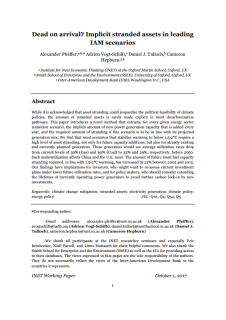
While it is acknowledged that asset stranding could jeopardize the political feasibility of climate policies, the amount of stranded assets is rarely made explicit in most decarbonization pathways. This paper introduces a novel method that extracts, for every given energy sector transition scenario, the implicit amount of new power generation capacity that is added every year, and the required amount of stranding if this scenario is to be in line with its projected generation mix. Integrated Assessment Modles (IAMs) have been the key tools for the analysis of climate change impacts since the foundation of the IPCC (Clarke et al., 2009). They are now used for the economic assessment of climate change policies in the IPCC’s ARs, and by governments around the world.
The authors find that most scenarios that stabilize warming to below 1.5-2°C require a high level of asset stranding, not only for future capacity additions, but also for already existing and currently planned generators. The findings have implications for investors, who might want to re-assess current investment plans under lower future utilization rates, and for policy makers, who should consider extending the lifetimes of currently operating power generators to avoid further carbon lock-in by new investments.
